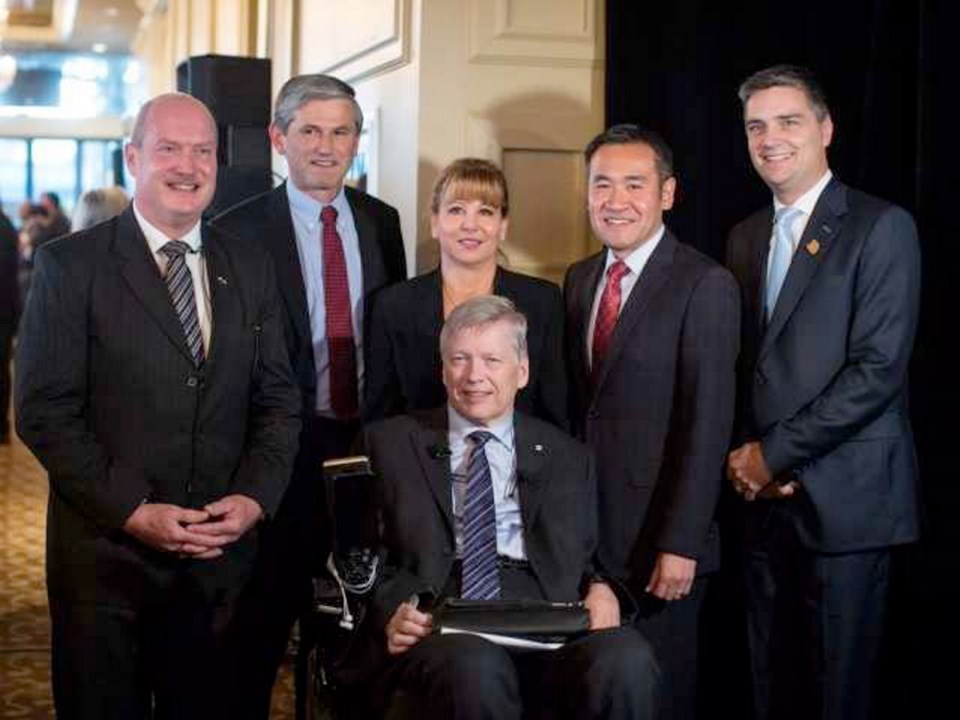 Field notes on the six contenders for the B.C. Liberal leadership race, concluding Feb. 3:
Field notes on the six contenders for the B.C. Liberal leadership race, concluding Feb. 3:
• Mike de Jong — He bounced into politics in 1994 by beating Grace McCarthy and was an occasionally loopy member of the Liberal rat pack for seven years. After the Liberals took power in 2001, he evolved into a competent cabinet minister with a huge range of experience. He has handled major portfolios, including attorney general, finance, health and forests, plus acted as house leader.
Last time he ran for the leadership, he came fourth out of four, dropping out after getting just nine per cent of the vote. It raises the question of whether he’s a natural-born lieutenant, as opposed to a leader.
His key move to date was to pick up Rich Coleman’s endorsement on the weekend. Coleman is a powerhouse within the party, with a long list of favours he can call in from people all over B.C. De Jong is doing better than he did seven years ago.
• Michael Lee — You can come out of a leadership race a winner, even if you don’t win, by building profile, making connections and gaining clout. That looked to be what the rookie MLA and former corporate lawyer was setting out to do.
But then he started drawing noticeably large crowds to rallies. Now he’s claiming a good share of the new members were signed up by his camp. The son of Asian immigrants has a conservative platform that includes low taxes and cuts to tolls, service charges and user fees. He’s doing better than expected.
• Todd Stone — He made his name as a transportation minister who liked building things, and liked scaling back things (the ferry system), as well. He has been preparing for this moment for a long time.
He was an obvious future leadership contender from the moment he walked into the legislature in 2013 as an MLA. (Maybe even earlier than that — he was head of the Young Liberals and worked in Campbell’s office as a junior staff member.) Stone, on the Liberal side of the Liberal party, just sold the Kamloops tech company that was his career before politics.
That renewed emphasis on “keep right except to pass” on B.C.’s highways, and the selective 120 km/h speed limit? That was Stone.
• Sam Sullivan — Sullivan loves conceptual thinking, and he has come off as the smartest person on stage at more than one event. He’s not afraid to pitch different ideas. A new harmonized sales tax, called the modified sales tax. Limited privatization of health care. Charter schools.Sell the provincial alcohol business to government employees. End the overlap and duplication among first responders (fire, police ambulance).
He cut a wide swath as an idea man during his term as Vancouver mayor and is a tenacious competitor. He won’t likely win, but some of his ideas might come into play.
• Dianne Watts — Brought a lot of oomph to the race when she joined Sept. 24. But she stalled out for a time, appearing tongue-tied at some events and bereft of anything interesting to say at others. Earlier, she built a solid reputation as mayor of Surrey and she won a federal seat as a Conservative against the national Liberal tide. Those still count for something.
As the only non-caucus member, she is a distinct outsider. But she has clean hands on all the desperate manoeuvres the others supported to try to stay in power last summer.
• Andrew Wilkinson — Gordon Campbell 2.0. He’s smart, driven, successful and has an abiding mistrust of the NDP. His public persona is sometimes perceived as distant and hard to relate to comfortably. That didn’t stop Campbell from winning three elections and wouldn’t necessarily stop him. Wilkinson worked closely with him in the party and in government.
They share one key experience — being kicked in the teeth by the vagaries of the voting system. Campbell won the popular vote in 1995, but lost the election on the seat count. Wilkinson just went through a similar experience as a cabinet minister, winning last May by two seats, but then watching as the NDP and Greens ganged up and voted his side out of office last summer.
He was born in Australia, but raised in B.C. and worked all over the province.



